- |
User Links
Come, Thou Redeemer of the earth And manifest Thy virgin birth

Come, Thou Redeemer of the earth And manifest Thy virgin birth
Author: St. Ambrose ; Translator: J. M. NealeTune: PUER NOBIS NASCITUR
Published in 14 hymnals
Printable scores: PDF, MusicXMLAudio files: MIDI
Representative Text
1 Come, thou Redeemer of the earth,
and manifest thy virgin-birth:
let every age adoring fall;
such birth befits the God of all.
2 Begotten of no human will,
but of the Spirit, thou art still
the Word of God, in flesh arrayed,
the Saviour, now to us displayed.
3 From God the Father he proceeds,
to God the Father back he speeds,
runs out his course to death and hell,
returns on God's high throne to dwell.
4 O equal to thy Father, thou!
Gird on thy fleshly mantle now,
the weakness of our mortal state
with deathless might invigorate.
5 Thy cradle here shall glitter bright,
and darkness glow with new-born light,
no more shall night extinguish day,
where love's bright beams their power display.
6 O Jesu, virgin-born, to thee
eternal praise and glory be,
whom with the Father we adore
and Holy Spirit, evermore. Amen.
Source: Ancient and Modern: hymns and songs for refreshing worship #32
Author: St. Ambrose
 Ambrose (b. Treves, Germany, 340; d. Milan, Italy, 397), one of the great Latin church fathers, is remembered best for his preaching, his struggle against the Arian heresy, and his introduction of metrical and antiphonal singing into the Western church. Ambrose was trained in legal studies and distinguished himself in a civic career, becoming a consul in Northern Italy. When the bishop of Milan, an Arian, died in 374, the people demanded that Ambrose, who was not ordained or even baptized, become the bishop. He was promptly baptized and ordained, and he remained bishop of Milan until his death. Ambrose successfully resisted the Arian heresy and the attempts of the Roman emperors to dominate the church. His most famous convert and disciple w… Go to person page >
Ambrose (b. Treves, Germany, 340; d. Milan, Italy, 397), one of the great Latin church fathers, is remembered best for his preaching, his struggle against the Arian heresy, and his introduction of metrical and antiphonal singing into the Western church. Ambrose was trained in legal studies and distinguished himself in a civic career, becoming a consul in Northern Italy. When the bishop of Milan, an Arian, died in 374, the people demanded that Ambrose, who was not ordained or even baptized, become the bishop. He was promptly baptized and ordained, and he remained bishop of Milan until his death. Ambrose successfully resisted the Arian heresy and the attempts of the Roman emperors to dominate the church. His most famous convert and disciple w… Go to person page >Translator: J. M. Neale
 John M. Neale's life is a study in contrasts: born into an evangelical home, he had sympathies toward Rome; in perpetual ill health, he was incredibly productive; of scholarly temperament, he devoted much time to improving social conditions in his area; often ignored or despised by his contemporaries, he is lauded today for his contributions to the church and hymnody. Neale's gifts came to expression early–he won the Seatonian prize for religious poetry eleven times while a student at Trinity College, Cambridge, England. He was ordained in the Church of England in 1842, but ill health and his strong support of the Oxford Movement kept him from ordinary parish ministry. So Neale spent the years between 1846 and 1866 as a warden of Sackvi… Go to person page >
John M. Neale's life is a study in contrasts: born into an evangelical home, he had sympathies toward Rome; in perpetual ill health, he was incredibly productive; of scholarly temperament, he devoted much time to improving social conditions in his area; often ignored or despised by his contemporaries, he is lauded today for his contributions to the church and hymnody. Neale's gifts came to expression early–he won the Seatonian prize for religious poetry eleven times while a student at Trinity College, Cambridge, England. He was ordained in the Church of England in 1842, but ill health and his strong support of the Oxford Movement kept him from ordinary parish ministry. So Neale spent the years between 1846 and 1866 as a warden of Sackvi… Go to person page >Text Information
| First Line: | Come, Thou Redeemer of the earth And manifest Thy virgin birth |
| Latin Title: | Veni, Redemptor gentium |
| Author: | St. Ambrose |
| Translator: | J. M. Neale |
| Language: | English |
| Copyright: | Public Domain |
Tune
PUER NOBIS NASCITURPUER NOBIS is a melody from a fifteenth-century manuscript from Trier. However, the tune probably dates from an earlier time and may even have folk roots. PUER NOBIS was altered in Spangenberg's Christliches GesangbUchlein (1568), in Petri's famous Piae Cantiones (1582), and again in Praetorius's (P…
VENI REDEMPTOR GENTIUM (Mode 1)


 My Starred Hymns
My Starred Hymns





